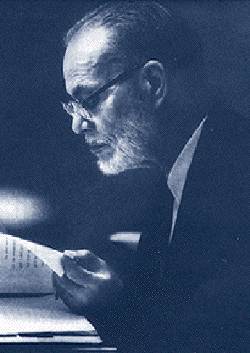 By Yasser Latif Hamdani
By Yasser Latif Hamdani
Last week (February 6) marked the 114th Birthday of one of Pakistan’s greatest unsung heroes. Once again, there was no mention of commemoration of his remarkable like. No sense of gratitude from a nation for which he did so much. He has been wiped out of our memory because he was an Ahmadi, despite his glorious contributions to Pakistan and its cause (see related post on Dr. Abdul Salam).
Sir Zafrullah Khan’s services rendered to Muslims of India, Pakistan and the Third World are second only to that of Quaid-e-Azam Mahomed Ali Jinnah. As a jurist, a diplomat and a patriot he stood head and shoulders above the lesser men who have made a mockery of our republic.
Born in 1893 in Sialkot in what was to become one of the earliest Ahmaddiya households, this small town boy rose to be one of the shrewdest legal minds of his time. His early education was in Sialkot, after which he proceeded to Lahore for his bachelors degree, under the tutelage of none other than the great Iqbal himself. He got his law degree from King’s College London in 1914, where he stood top of his class and was the first person from the Indian subcontinent to do so. He was, like most great figures of that time, called to bar at Lincoln’s Inn.
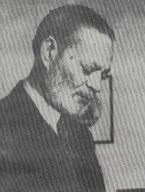
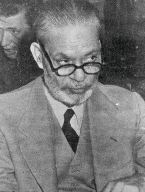
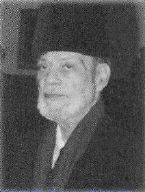


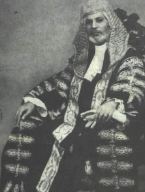
As a practicing lawyer, he soon proved his mettle and had many reported cases to his name. The first major politician to recognize Zafrullah’s talents was Sir Fazli Hussain, the founder of Unionist Party of Punjab. Starting his career in his early 30s as a member of the Punjab legislative Council, he rose to prominence as an indefatigable crusader for Muslims of Punjab. Later he represented the Muslims at round table conference and crossed swords with figures like Jinnah and Gandhi. In 1931, he became the Muslim League president and at the roundtable conference, he cornered no less a person than Churchill in a committee hearing who was forced to accept Zafrullah’s point of view.
Later he was offered a seat on Viceroy’s permanent Council, which he took to further his cause. He also served at varying times as the minister of Railways, Public works, labour and law under the Viceroy. For a brief period, he also became British India’s representative to the League of Nations, just before it was dissolved.
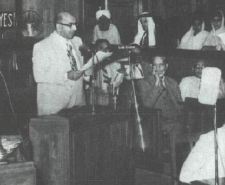
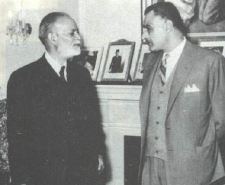
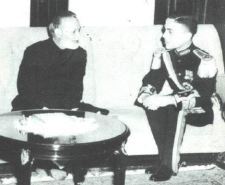
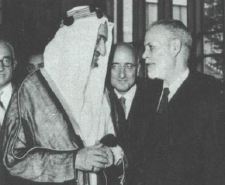
![]()
However his greatest contribution came when he drafted the famous Lahore Resolution, which till this day is the rallying point of Pakistan and Pakistani nationalism. He had been tasked with finding a common point between the popular demand for “Pakistan” and Muslim League’s all India requirements. The Lahore resolution was a broad based solution which left the door virtually open for several solutions and negotiation on the issue of partition. In essence it envisaged 2 or 3 great republics for the Muslim peoples and it was this document which forms the basis not just of Pakistan but also of Bangladesh. For this he got a lot of slack. No less a person than Khan Abdul Wali Khan highlighted Zafrullah’s religious belief to play on the popular conspiracy theory that holds Ahmadis to be British touts.
Later from 1942 onwards, he served as a federal judge (equivalent of an Supreme court C judge) of India and finally took leave on the eve of Pakistan to serve the cause of Pakistan before the Radcliffe Commission, on Jinnah’s personal request. On 25th December 1947, Jinnah appointed him the Foreign Minister of Pakistan. At the UN, Sir Zafrullah emerged as the most eloquent advocate of all third world and Islamic issues. It was Zafrullah whose efforts materialized into the UN Resolutions on Kashmir, which are the basis of the Pakistani case and grievance. Later he became the first Asian president of the International Court of Justice, a singular and unique honor for any Pakistani. He also served, briefly, as the President of the UN General Assembly. He passed away in September of 1983 in Lahore.
A prolific author on the history of Pakistan and Islam, his most famous book was titled “Agony of Pakistan” in which he makes plain the great betrayal which wrested the country from the hands of its patriots into the hands of those who were its greatest enemies. Ironically, today Jinnah’s most trusted lieutenant is not even remembered by the state which owes him so much, including its own founding document. It is the memory of people like Zafrullah Khan that will keep alive the original idea of Pakistan and there is no doubt that one day the posterity will reclaim its true destiny as a progressive and modern republic.
Yasser Latif Hamdani is a lawyer in Lahore and a researcher of the history of the Pakistan Movement.




















































The Statesman, Delhi, dated October 8, 1947, editorially observes:
[quote]For the first time the voice of Pakistan was heard in the counsels of the United Nations on a burning topic of world-wide significance when leader of this country’s delegation, Chaudhry Zafarullah Khan, addressed the United Nations Palestine Committee at Lake Success on Tuesday. It was a telling speech which tore into shreds the specious pleas put forward by the advocates of the partition of Palestine [ie creation of Israel ed.]. Chaudhry Zafarullah did not merely indulge in rhetoric when he described the partition plan as `physically and geographically a monstrosity’, he proceeded to prove this by unassailable arguments. Answering the contention that the migration of more Jews into Palestine should be permitted because the Jewish displaced persons desired to go to that country, Pakistan’s spokesman asked whether the Americans would consent to relax or abrogate their own immigration laws if displaced persons of various other nationalities desired to enter the United States and settle there? Would America, he further asked, agree to take in the five million displaced persons of the Punjab if they desired to leave the scene of their suffering and cross over to the United States. We have little doubt that the Arabs will rejoice to find the voice of Pakistan so powerfully raised in the United Nations in defence of their cause. The addition of the independent sovereign state of Pakistan to the community of free Muslim peoples of the World is already beginning to have its effect on international affairs.[/quote]
Al-Syed Ahmad Asim, Sajada Nashin Dargah Hazrat Sheikh Abdul Qadir Gilani, Baghdad, a cousin of Al-Syed Abdul Qadir Al-Gilani, former Ambassador of Iraq to Pakistan, in his letter in Urdu dated July 5, 1948, addressed to Muhammad Zafarullah Khan, writes:
[quote]I avail of this opportunity to thank you from the core of my heart, on my behalf as well as on behalf of the family of Hazrat Gous-ul-Azam, for the great Jihad you waged in a purely Islamic spirit in support of the Holy Land of Palestine before the United Nations. I earnestly pray that Almighty Allah may grant you full recompense for your services and enable you to further serve the cause of Islam.[/quote]
[quote comment=”34098″]
BTW, thanks for telling me the real faces behind naseeb.com. I am also subscribed with that site and now I know why one of my entry was removed from “Journals”. I would soon make a post about the real motive behind naseeb.com and have forwarded to few others to take care of this website.[/quote]
I would like to know more. Can you share this with me personally?
Part III,
A statement of Maulana Maududi about the referendum in the NWFP makes his position crystal clear:
[quote post=”568″]”Referendum is cardinally different from ordinary voting in elections to legislative assemblies (under Islamic rule). Referendum is about which of the two countries — India or Pakistan — this area is to be a part. Voting in such a referendum is not repugnant to Shari’ah. As such wherever referendum is being held the members of the Jama‘at are free to vote in this referendum. Members are free to vote according to their own conscience. However, I can say in my personal capacity that if I were a resident of the NWFP province my vote in the referendum would have been in favor of PAKISTAN. As the division of the country is taking place on the basis of Hindu and Muslim nationalism, all these areas where Muslims are in a majority should go with the country which symbolizes Muslim nationalism” (Kausar, 5th July, 1947, Tahrik-e Azadi aur Musalman, vol. II, pp. 287-288)[/quote]
Please see the following note he wrote on Quaid’s death in Tarjumanul Qur’an by Maulana Maududi:
”
[quote post=”568″]After him, there is none among us, neither as an individual nor even as a group, who could draw people’s love and command their respect, whose sincerity, wisdom, courage and fortitude could be banked upon and whose charisma could have pulled together the disparate elements of our national fabric. Whatever image and name Pakistan had inside and outside owed to his tested statesmanship. For the world, his death may be the passing of a great man and a leader. But for us, it is a national calamity, for in his death our fledging state has suffered beyond redemption, which only Allah the Most Merciful can compensate.”[/quote]
Part II,
Syed Sharifuddin Pirzada was Secretary to Quaid-e-Azam and has compiled major documents about the freedom movement. In his book Evolution of Pakistan (Lahore: All Pakistan Legal Decisions, 1963), he says about Maulana Maududi:
“In a series of articles in the Tarjumanul Qur’an, in 1938 and 1939, Maududi unmasked the Congress and warned the Muslims. He related the history of the Muslims of the Sub-continent, debunked Congress secularism and showed the unsuitability of India for democratic rule as there would be only one Muslim vote against four Hindu votes. He condemned the national imperialism of the Hindus and opined that separate electorates, weighage in Assembly seats and reservation of proportion in services could not solve the political problems of the Muslim nation. His proposals embodied three alternatives: